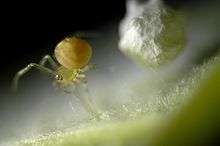Paidiscura
Paidiscura is a genus of comb-footed spiders that was first described by Allan Frost Archer in 1950.[2]
| Paidiscura | |
|---|---|
 | |
| Paidiscura pallens | |
| Scientific classification | |
| Kingdom: | Animalia |
| Phylum: | Arthropoda |
| Subphylum: | Chelicerata |
| Class: | Arachnida |
| Order: | Araneae |
| Infraorder: | Araneomorphae |
| Family: | Theridiidae |
| Genus: | Paidiscura Archer, 1950[1] |
| Type species | |
| P. pallens (Blackwall, 1834) | |
| Species | |
|
4, see text | |
Species
As of May 2020 it contains four species, found in Asia, Africa, and Europe:[1]
- Paidiscura dromedaria (Simon, 1880) – Cape Verde Is., Spain, France, Italy, Greece, North Africa to Middle East
- Paidiscura orotavensis (Schmidt, 1968) – Canary Is., Madeira
- Paidiscura pallens (Blackwall, 1834) (type) – Europe, Algeria, Turkey, Georgia, Russia (Europe to South Siberia)
- Paidiscura subpallens (Bösenberg & Strand, 1906) – China, Korea, Japan
Formerly included:
- P. genistae (Simon, 1873) (Transferred to Theridion)
- P. genistae (Charitonov, 1946) (Transferred to Theridion)
- P. musiva (Simon, 1873) (Transferred to Ruborridion)
- P. pinicola (Simon, 1873) (Transferred to Theridion)
In synonymy:
- P. bigibba (O. Pickard-Cambridge, 1912) = Paidiscura dromedaria (Simon, 1880)
- P. caboverdensis (Schmidt & Piepho, 1994) = Paidiscura dromedaria (Simon, 1880)
- P. caninotata (Bösenberg & Strand, 1906) = Paidiscura subpallens (Bösenberg & Strand, 1906)
- P. mirabilis (Zhu, Zhang & Xu, 1991) = Paidiscura subpallens (Bösenberg & Strand, 1906)
- P. palustre ) = Paidiscura dromedaria (Simon, 1880)
gollark: (sin x = x only works for radians)
gollark: Approximations are fun! π = e = 3 = sqrt(g), sin x = x = tan x, etc.
gollark: It's *approximately* 3, though.
gollark: π is approximately 3.
gollark: I refuse to acknowledge "tiktok" videos.
See also
References
- "Gen. Paidiscura Archer, 1950". World Spider Catalog Version 20.0. Natural History Museum Bern. 2020. doi:10.24436/2. Retrieved 2020-06-30.
- Archer, A. F. (1950). "A study of theridiid and mimetid spiders with descriptions of new genera and species". Museum Paper, Alabama Museum of Natural History. 30: 1–40.
Further reading
- Knoflach, B.; Thaler, K. (2000). "Notes on Mediterranean Theridiidae (Araneae) - I". Memorie della Società Entomologica Italiana. 78: 411–442.
- Wunderlich, J. (1987). Die Spinnen der Kanarischen Inseln und Madeiras: Adaptive Radiation, Biogeographie, Revisionen und Neubeschreibungen. Triops, Langen. p. 435.
- Le Peru, B. (2011). "The spiders of Europe, a synthesis of data: Volume 1 Atypidae to Theridiidae". Mémoires de la Société Linnéenne de Lyon. 2: 1–522.
- Wunderlich, J. (2008). "On extant and fossil (Eocene) European comb-footed spiders (Araneae: Theridiidae), with notes on their subfamilies, and with descriptions of new taxa". Beiträge zur Araneologie. 5: 819–859.
- Song, D. X.; Zhu, M. S.; Chen, J. (1999). The spiders of China. Hebei Science and Technology Publishing House, Shijiazhuang. p. 640.
This article is issued from Wikipedia. The text is licensed under Creative Commons - Attribution - Sharealike. Additional terms may apply for the media files.